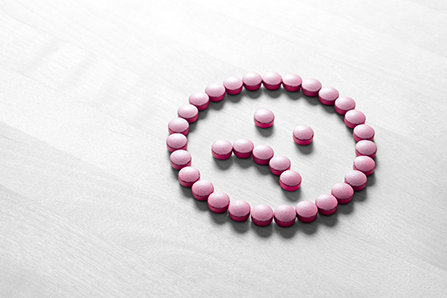Many Doctors Are Trained to Reach for Medication First and Solutions Second

The field of medicine is an important profession where lives hang in the balance on a daily basis. It is assumed by nearly everyone without a medical degree that the physician always knows best. We are hesitant to press doctors— whom we believe hold our lives in their hands—with questions relating to the type of care they are providing. And then too, many physicians grow tired of patients who think they are able to treat themselves from what they read on the internet.
Let’s be clear: you should always take your doctor’s advice AFTER getting answers to your questions. Make sure you are informed and, if in doubt, ask for a second opinion or another option. The fact is that not all medical advice is sound and one will occasionally hear a story of a doctor’s practices that are simply too far out, too ridiculous, too obviously unethical or nonsensical to remain within the benefit of the doubt.
In a recent news report published in USA Today, it came to light that a number of doctors are not treating opioid addicts with sufficient care. I can’t say I’m particularly shocked by this, but let’s keep going.
It’s not news that the medical profession wants easy, simple solutions to medical conditions and that medication is one of their top resources. Replacement drugs have long been used by physicians in an unsuccessful attempt to treat addiction. In the end, it simply creates a “safer” addict. Safer for who you might ask? Well studies have shown that while the addict still continues to suffer from numerous side effects, bone degeneration and complete reliance on a drug to prevent sickness, this approach may reduce the crime rate, it may reduce the risk of disease—but I can tell you it does not actually treat addiction and does not return the addict to be a contributing member of society. Instead, it creates a class of “zombies,” waking up every morning at 6:00 am to get their fix at the methadone clinic down the street, and just like zombies, many addicts are never given another option.
The Story
The USA Today article from May 9, 2019, gave a more or less neutral coverage of the increase in doctors dropping out crucial forms of treatment and addressing addiction only with buprenorphine or methadone. However, the article did talk about how at least 30 state Medicaid programs still require that patients engage in multiple treatment resources.
The article goes on to discuss the debate regarding medication-assisted therapy and its relative need (or lack thereof) to be included with other treatment methods. But two huge mistakes are being made on a national level that the article fails to explore thoroughly. One is that doctors are dropping out multiple areas of treatment that might actually help recovering addicts. The other is that doctors are relying on drugs to treat addicts. These are big mistakes, and they deserve ample coverage in the media.
Why Medication-Assisted Therapy Does Not Work

Our nation moves closer and closer to fully supporting methadone and buprenorphine drugs as a “legitimate” treatment for opioid addiction. That is a huge error, as no drug can ever be as effective as actually stopping all drugs and seeking real treatment. A medication might mask the symptoms of addiction, but that’s all it does. It is akin to placing a bandage on a severed artery. If you do not stitch the wound and remedy it properly, it will continue to bleed, bandage or no bandage.
Because the medical administration is moving steadily towards a pro-medication stance for treating addicts, it is difficult to find legitimate research that provides evidence of the risks in these medications. However, after some diligent searching, we were able to find a 2012 study published in the JAMA Network which discusses the very real presence of methadone in thousands of drug overdose fatalities.
“Methadone was involved in more than 30% of overdose deaths linked to the use of prescription painkillers…”
According to that study, “Methadone was involved in more than 30% of overdose deaths linked to the use of prescription painkillers in 2009, despite the drug making up only about 2% of painkiller prescriptions that year, according to a report from the U.S. Centers for Disease Control and Prevention (CDC).”
That research paper quoted Dr. Thomas R. Frieden, former director of the Centers for Disease Control and Prevention. According to Dr. Frieden, as the number of methadone prescriptions increased, methadone overdose deaths also increased. The former director went on to say that at least 5,000 people die in the United States from methadone overdoses every single year. Life-saving, addiction-curing medicine? Doesn’t seem like it. It sounds more like methadone is a risky and dubious attempt at a “quick-fix” for addiction, an effort that is just as likely if not more likely to have an adverse effect than a positive one.
For buprenorphine, it might surprise readers to know that there is almost no data in the United States on overdose risks attendant with this drug. While the CDC and other organizations report heavily on overdose risks from most narcotics and even most pharmaceuticals, it is almost impossible to find reports on buprenorphine risk.
So we look to international reports—one being a study authored by a group of United Kingdom researchers who analyzed both methadone overdoses and buprenorphine overdoses. Indeed, the risk of overdose is much higher with methadone, but there is still some risk with buprenorphine. According to the U.K. research, 52 people died from overdoses on buprenorphine in England and Wales from 2007 to 2012. In that same period, 2,366 people died in England and Wales from overdoses on methadone. So yes, buprenorphine is less risky than methadone, but there is an identifiable risk with it.

Why would a doctor treat an addicted patient with a drug which had any chance of killing the patient? In fact, why would a doctor treat a drug addict with medications at all? Using medicine to treat addiction does not make sense. An addiction to drugs and alcohol is an overwhelming crisis of the mind, body and spirit. It is a multi-faceted concern. This is not something that one can prescribe a drug for and call it good. It just doesn’t work that way. Drug addicts and alcoholics need residential care in a program that uses a variety of treatment methodology to help recovering addicts break free from drugs and alcohol.
Treatment for Addiction Should Be Drug-Free and Delivered in a Residential Setting
George Kolodner, an addiction specialist from Washington D.C., was mentioned in the USA Today article as he commented on the increasing prevalence of “medication-only” approaches to addiction treatment. He insisted that, as healthcare providers edge more and more towards treating addicts only with medication and no other forms of therapy, the healthcare provider descends a slippery slope and becomes an enabler to the addict-patient. The addict becomes reliant on the drugs to “keep him sober.” And the healthcare provider is the only one who can get him those meds. But is anyone really “sober” if they still must take expensive, potentially addictive medication?
Another addiction expert practicing at Johns Hopkins believes firmly that offering medications like buprenorphine to addicts without also requiring that those addicts enroll in other, therapy-based treatment models is unethical. Dr. Kenneth Stoller said that “Simply providing a low level of care with only medication and then hoping the person will eventually decide to engage further—doing that is selling patients short.”
When someone is addicted to drugs and alcohol, they need actual care, from addiction treatment experts, in a monitored, intensive, residential setting. They need all of this because that is what it takes to effectively address the multifaceted, complex crisis that is a drug problem or alcoholism. No medication will save addicts from their drug habit.
Sources:
- https://www.usatoday.com/story/news/investigations/2019/05/09/opioid-crisis-drugs-no-therapy/1131110001/
- https://jamanetwork.com/journals/jama/article-abstract/1352108
- https://bmjopen.bmj.com/content/5/5/e007629


 ®
®